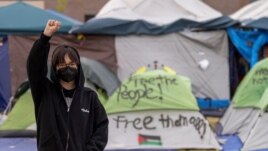18 May 2024
How long student protests over the war in Gaza can continue is in question with the removal of encampments, graduations and summer break.
The student protests came after the Israeli offensive in the Palestinian territory of Gaza. The offensive was to answer the Hamas attack on October 7 that killed some 1,200 people in southern Israel. The resulting war in Gaza has killed more than 35,000 people, including civilians and fighters. Those numbers come from Gaza's Health Ministry and are not independently confirmed.
The protesters say they will continue until college officials meet their demands. They include a permanent ceasefire in Gaza and ending university investment in companies profiting from the war. They also include the removal of punishments for students and school employees for protesting.

FILE - Student protest organizer, Steph W. raises her right fist as she poses for a portrait at an encampment in support of Palestinians in Gaza at the Auraria Campus in Denver, Colorado, U.S., May 10, 2024. (REUTERS/Kevin Mohatt)
Experts who study protest movements say it is difficult to continue the protests' energy if most of the students are gone. But they also point out that student demonstrations are just one way to protest in the wider pro-Palestinian movement that has existed for many years. They say this summer will provide more chances for the energy that started at universities to move to the streets.
Evolve or disappear
Dana Fisher is a professor at American University in Washington, D.C. She has written several books on social movements and has seen some of her students among protesters at the university.
She noted the campus protests spread across the country as a response to police activity at Columbia University on April 18. More than 100 people were arrested then. Since those first arrests, the Associated Press estimated that nearly 2,900 people have been arrested at 57 colleges and universities around the U.S.
Fisher told Reuters news agency that she does not see enough organizational structure for the young people to continue protesting when they are not at school. She said the movement will have to evolve "or it can't continue."
In Denver, Colorado, police on April 26 arrested 45 people at an encampment protest at the Auraria campus used by the University of Colorado-Denver, Metropolitan State University, and the Community College of Denver.
On May 8, the students returned for a sit-in inside the Aerospace and Engineering Sciences building. The building was developed in part with a $1 million gift from arms manufacturer Lockheed Martin.
Steph, who chose to not give her last name due to fear of punishment, is a 21-year-old student on the Auraria campus. She said, "We're keeping our protests up and our encampment going until our demands are met, however long that takes." She added, "We'll be here through summer break and into next fall if needed."
Fisher said the police response to protests has helped create a sense of activism in a new generation of students. She thinks the current campus demonstrations are the beginning of a "long, hot summer of protest" about many issues.
And she thinks the Republican National Convention in July and the Democratic National Convention in August will become targets for large protests.
Fisher said the current police response has been "much more aggressive and repressive" than the time of student-led protests against the Vietnam War in the 1960s. "And then... in the middle of all that the presidential election," she added.
After graduation, a ghost town
Michael Heaney teaches politics at the University of Glasgow in Britain. His research and books have dealt with U.S. protest movements.
Heaney said the campus protests are just one method in the wider movement to support Palestinians, an ongoing effort that goes back many years. He pointed to the U.S. civil rights protests that went back 200 years, saying just because one moment of protest ends does not mean the end of a movement.
He said pro-Palestinian protests in American cities this summer could grow if Israel's offensive in Gaza continues. And he added that such demonstrations would have been supported by the widespread university activism.
Jacob, 22, is one of the student protest organizers on Denver's Auraria campus. He said, "After graduation, it may be a ghost town on this campus - but we'll still be here." He added, "We're not going anywhere."
I'm Gregory Stachel. And I'm Gena Bennett.
Brad Brooks reported this story for Reuters. Gregory Stachel adapted it for VOA Learning English.
_________________________________________________
Words in This Story
campus – n. the area and buildings around a university, college, or school
response – n. something that is done as a reaction to something else
evolve – v. to change or develop slowly often into a better, more complex, or more advanced state
ghost town – n. a town that no longer has any people living in it